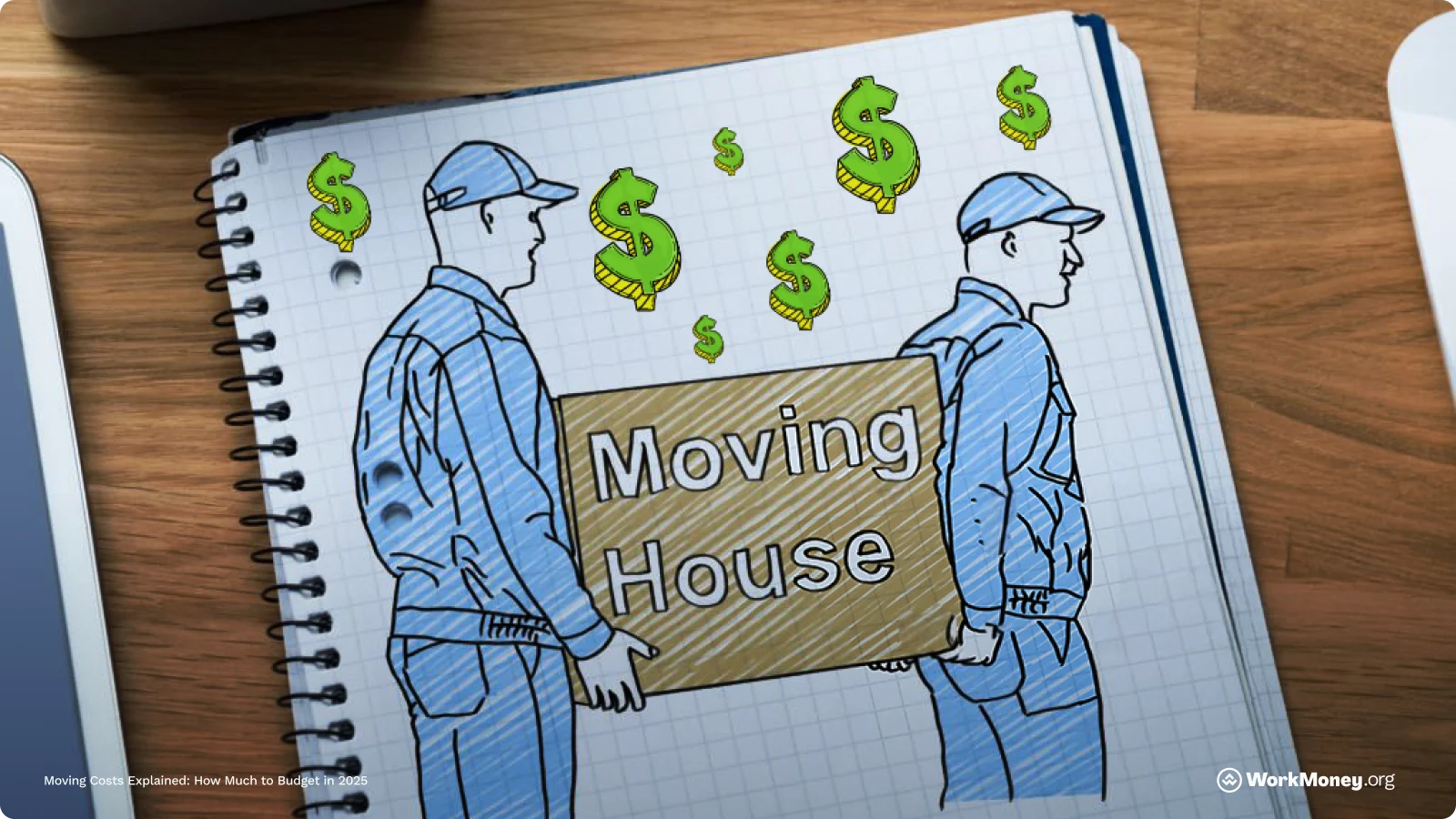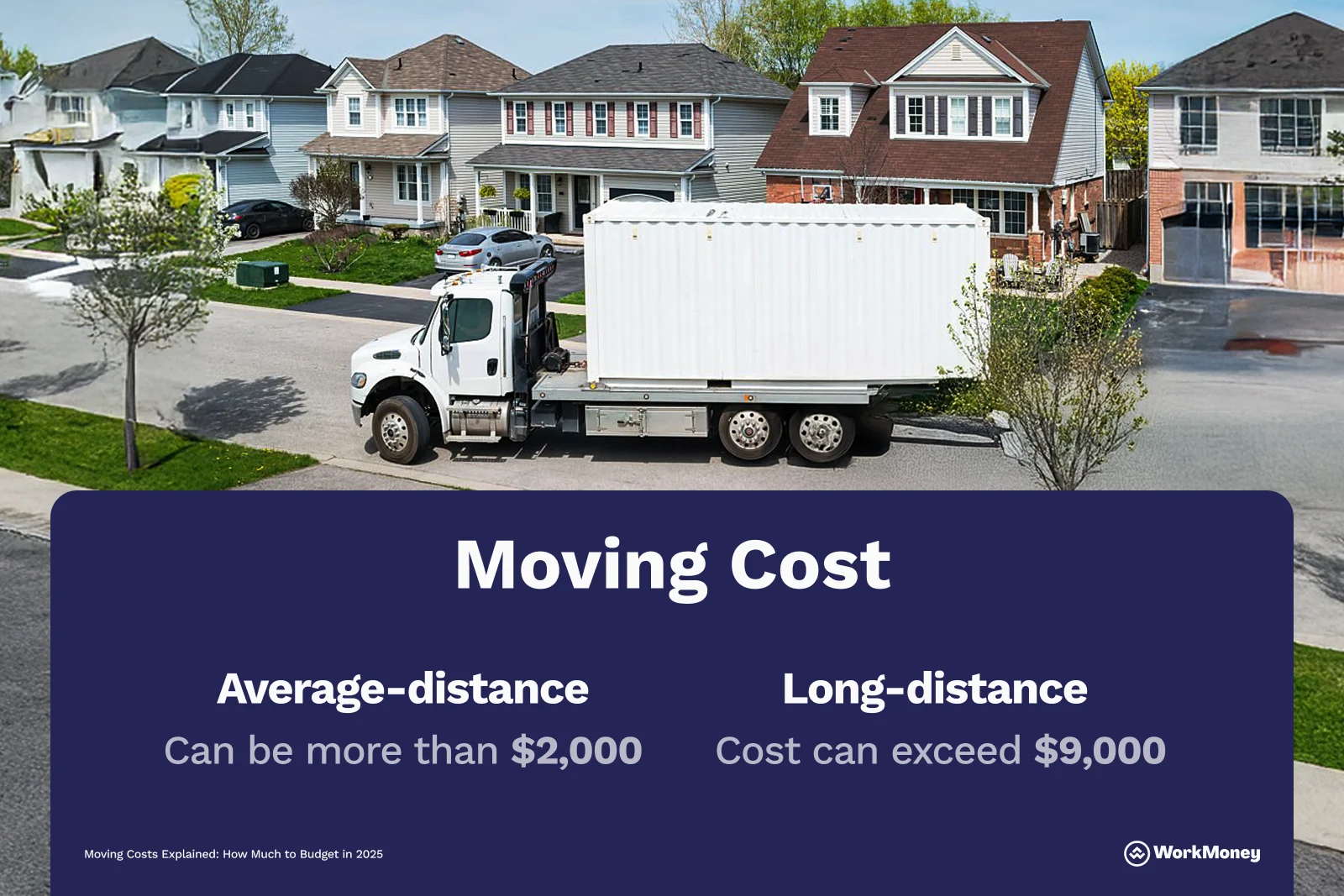Moving Costs Explained: How Much to Budget in 2025
Your guide to budgeting for movers, from local moves to long-distance hauls.

Moving costs can add up whether you hire professionals or take a do-it-yourself route. It’s not easy, especially for those with tight budgets. A recent survey showed that the average move cost over $2,000 in 2024. However, moving costs vary widely based on where you live, where you’re moving to, and how much you need professionals to manage when it comes to your stuff.
If you’re planning an upcoming move or trying to gauge how much it would cost, WorkMoney put together a guide to help you navigate these expenses.

Average costs of moving
There is no set standard for how much you’ll pay for a move. The costs will range widely based on the vendor. Here’s what you need to know.
Long distance vs. local
A local move is typically 100 miles or less, with long-distance moves exceeding 100 miles. The average cost for a local, full-service move is $7,600, according to Move.org. A long-distance move with hired help averages $9,140.
Moving truck
A rental truck can be one you drive yourself or your movers drive. If you’re doing the move yourself, this is typically the most expensive part. A truck rental can cost anywhere from $100 to $1,500, depending on the truck size, cost-per-mile, and how many days you’ll have the truck.
Movers vs. self-moving
Hiring movers to manage your move could cost anywhere from $600 to $5,000 or more. That’s a significant range,
depending on the number of items to be moved, supplies required, and the number of movers needed to complete the move.
Pro tip: If you need help staying in your home, consider looking into LegalHelp for assistance before being forced to move.
Supplies
To pack everything up and move it from one place to another, you’ll need boxes, tape, and moving equipment (think moving blankets, hand trucks, and bungee straps). These could cost you upwards of $400.
Pro tip: You can pick up many of these supplies for much cheaper on Facebook Marketplace from someone who has recently moved.
Cost per room
How many rooms will get packed up influences your moving costs.
Number of rooms | Average cost |
1 bedroom | $250-$500 |
2 bedrooms | $500-$900 |
3 bedrooms | $900-$1,500 |
4 bedrooms | $1,200-$2,800 |
Source: HomeAdvisor
When to enlist movers vs. DIY
Planning a DIY move is less expensive than hiring movers, but you put in more time, effort, and energy to execute it. It’s a judgment call for you to make when you need to hire help. Here’s what you may need to consider:
Long distance vs. local. When you’re going longer distances, it will cost you more to move you there. It’s more labor from your movers, more packing supplies, and more time to reach your destination.
Home size. The number of items you have and the size of your home impact how much it’ll cost for full-service movers to manage your move. Larger homes require more workers to complete timely move-outs, which drives up costs. But it also takes more of your time.
Moving truck. The size of your truck, how long you’ll have it, and how far you’re going all play a part in costs. You may not feel comfortable driving a larger truck for a big move.
The more work required for the move might be too much for you to handle alone. If that’s the case, you may want to hire movers and packing services to help out.
How to get moving quotes
Before you sign a contract, it’s important to vet your potential movers. To avoid a bad moving experience or potential scams, do as much research as you can on possible options.
Verify companies. Search online for movers in your area and see what states they cover. Once you’ve found a few options, check the Federal Motor Carrier Safety Administration (FMCSA) registered mover database. You’ll verify mover company information, complaints, and safety information. You can also use the Better Business Bureau (BBB), the State Movers Association, or the International Association of Movers (IAM).
Get it in writing. Have moving companies do in-person or virtual surveys to get you an accurate quote, and then get it in writing. Get at least three written quotes and compare them to see what's included.
Make sure you know who you’re working with. Find out if you’re hiring a moving company or a moving broker. Moving brokers book your move and then turn it around to sell it to a moving company. You don’t know the company you’re working with and haven’t been able to vet them, even as brokers arrange your entire move on your behalf. If you’re using a broker, check to see if they’re registered with the FMCSA and then ask for a list of moving companies they use so you can do your homework on potential movers.
Ask about all costs. Some companies charge extra fees for stairs or elevators, long carries, and specialty or bulky items. Get these costs in your survey and estimate so you have an accurate quote to shop around.
Request a binding agreement. A binding contract means you won’t pay more than your quoted price. By law, movers can’t charge more than 10% above the nonbinding estimate.
How to lower moving costs
Long before moving day, you need to get your things in order. Some pre-move planning can go a long way on moving day.
Declutter. Go through all your belongings and figure out what’s a must, a donation, and what’s trash.
Find free packing supplies. Head to your local grocery store or even a retailer to see if they have boxes available for you to take. Once stores unpack the boxes, they usually don’t need them.
Nontraditional move days and times. Summers and weekends are more popular times to move since it’s easier on scheduling. But it might be cheaper to book nontraditional days and seasons, if you can.
Do as much as you can yourself. Even for big moves, you can do a lot of the front-end work to lower moving costs. For instance, you can do all the decluttering and packing yourself, then hire movers to get your stuff out of your old home and into your new one.
Negotiate. After getting moving quotes, ask if you qualify for any deals or discounts. You’re allowed to see if there’s a better offer available.
If you’re unsure how much your move will cost, try using a moving calculator to get a better idea.
The bottom line
Moving costs can add up quickly, especially if you haven’t done your due diligence. Understand what’s included in your potential move to avoid surprises or, in some cases, moving fraud. Know your rights as a mover and find ways to lower your costs.
About the Author

Dori Zinn
Dori Zinn is a longtime personal finance journalist with nearly 20 years of experience in digital media. Her work has been featured in the New York Times, Wall Street Journal, CBS News, Yahoo, CNN, USA Today, and more. She loves helping folks learn about money. If she isn’t writing, she’s reading, baking, or watching football.